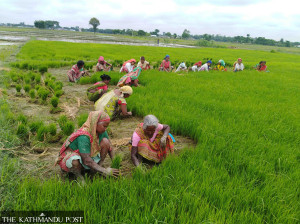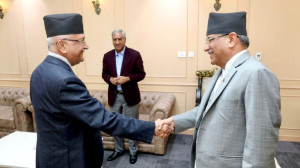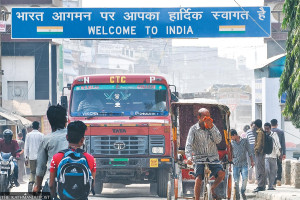 16.12°C Kathmandu
16.12°C KathmanduMovies
We need better romance movies
‘Parkhi Base Timilai’ is a tragic love story whose superficial characterisations and recycled narratives disappoint.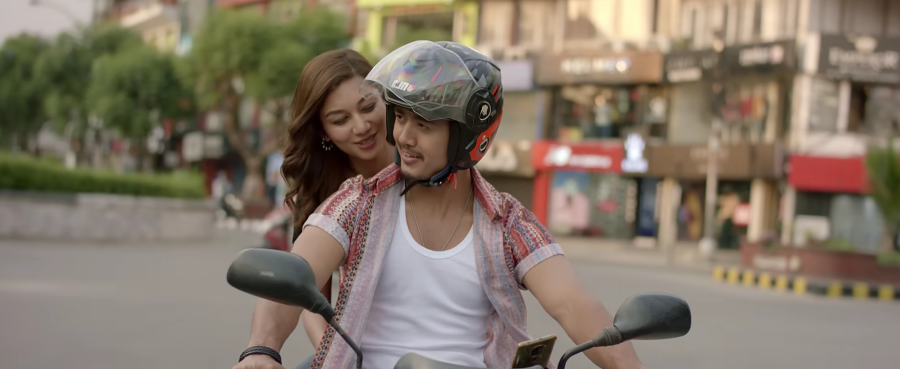
Manushree Mahat
The Greek philosopher Aristotle believed that the purpose of tragedy in a play is catharsis—an emotional release following a destructive event. This involves various elements, including plot, characters (hamartia, which we'll get into soon), thought, diction, spectacle and music.
The new Nepali movie, ‘Parkhi Base Timilai’, seems to tick all the boxes when it comes to Aristotle’s definition of tragedy, but does so in a superficial and unoriginal manner. In an attempt to present a modern perspective, the film relies heavily on familiar romance tropes, featuring one-dimensional main characters whose lives revolve around their love story. Even if there are facets of their existence beyond romance, they serve merely as a backdrop to propel the central romance forward.
‘Parkhi Base Timilai’ essentially recycles all the tired narratives we’ve already seen in cinemas and stands as an example of how Nepali romance films need a desperate evolution.
Let’s start off with the ‘hero’, Akash (Kiran Shrestha). He’s your typical, too-good-t0-be-true guy who goes out of his way to help the ‘heroine’ any way he can, despite having only met her once. He’s kind, helpful, sweet and flirtatious—the epitome of the ‘perfect guy’. Of course, this notion is dispelled at the beginning of the movie when we see that he has abandoned Aabha (Rakshya Budathoki) after promising to marry her. Aabha, who is playfully combative and initially clashes with Akash, soon falls deeply in love with him. Throughout the entire film, we barely get to know anything about her beyond her desire for Akash’s love. The narrative unfolds, going back and forth between the past and present of their relationship, to uncover why Akash, who is seemingly the perfect guy, has betrayed Aabha.
Before we can even get into the reasons for Akash’s departure, the writers deliberately depict him becoming increasingly unlikeable as the story progresses. The ‘perfect’ facade crumbles to reveal a selfish, nasty, apathetic persona as he continuously hurls one insult after another to the heartbroken Aabha, who, on the other hand, takes it all with the self-respect of a doormat.
This reminded me of the 2014 Anmol KC starrer ‘Jerryy’, and I mean that quite literally—the main character, who sacrifices his own happiness to spare the love of his life from heartbreak. Akash, the self-sacrificing character in this film, distances himself from his love to shield her from the reality of his impending death. While this might seem noble, the impact is diminished by Akash’s disrespectful insults towards his supposed love throughout most of the film. The writing portrays him as unlikeable and fails to wrap up his arc in a way that is sensitive to his struggles.
Aabha, for her part, lacks any backstory apart from the fact that she comes from a wealthy family, and is in love with Akash, who is a Pathao rider. Throughout the film, her arc hinges on her unconditional, almost obsessive love for Akash. She declares her love on multiple painful occasions and all he does is reject her every single time. For most of the film, all the role demands of Budathoki are to fall down and cry tears of agony.
Similarly, Sanjana (Anisha Rasaili), the second lead, has little personality beyond her persistent desire to be with Akash. She appears on screen, tries to make her move on Akash, gets a dance number, and occasionally appears in moments that make little difference to her arc or the overall story. And then she makes a big sacrifice in the end by futilely trying to patch things up with Akash and Aabha, and we’re supposed to believe that’s a sensible way to write a character’s arc.
Considering it’s a ‘tragic’ love story between Akash and Aabha, it makes sense for them to be the centre of the story. However, crafting a character with no purpose other than serving as a catalyst for the ultimate confrontation between the main love interests does a disservice to the plot, characters and actors involved.
The acting, across the board, is average. The dialogue delivery avoids memorable awkward or cringe-worthy moments, which is commendable. Shrestha effectively conveys Akash’s pent-up emotions through the aggression directed at Aabha, and Budathoki's portrayal of heartache feels natural at times. Wilson Bikram Rai, playing Akash’s boss in the motor repair shop, adds a touch of heartbroken, alcoholic comedy, delivering timely comical poetry that brings genuine laughter to an otherwise subdued film.
Aristotle’s elements of tragedy also include music, and ‘Parkhi Base Timilai’ gives us plenty of that, too. There are songs—too many of them, in fact—and not a single one that is catchy enough to justify the long musical interludes. Some feature colourful and cheerful attire, adding to the songs’ joviality. However, this gets overshadowed by recycled dance movements, including Akash bending backwards in what can only be likened to Shah Rukh Khan's signature pose.
Then there’s hamartia, simultaneously the most crucial and seemingly unnecessary aspect of tragedy in this film. Aristotle defines hamartia as the hero’s fatal mistake or flaw, which becomes the catalyst for the ultimate tragedy. In ‘Parkhi Base Timilai’, Akash’s hamartia appears to be his inability to communicate with Aabha and, ironically, his selfless desire to shield her from the potential news of his death. As my friend and I sat in the cinema hall (the only two people there), we speculated why Akash behaved so poorly. Our assumptions ranged from him being threatened by Aabha’s father to being misled by the same, and the most outrageous yet predictable notion—that he was about to die.
To our surprise, we were correct about that last one, but credit to the filmmakers because the next plot twist caught us off guard. It turns out Akash’s diagnosis was a misunderstanding; he had been confused with another Akash. What follows is a grand gesture to rectify his mistakes, and in a pattern familiar to many romance movies, he plans to gatecrash her wedding day.
Usually, there would be a happy ending where the main characters declare their undying love and months of heartache are resolved by one dramatic confession. However, ‘Parkhi Base Timilai’ takes a sharp left turn. Processing the mixed feelings this tragic end brings is challenging. On one hand, it seems inevitable, considering Aabha’s unwavering focus on Akash in her life. The way her character is written leaves no doubt that she will forgive any mistake Akash makes, highlighting a problem in the writing and direction.
If you’re going to write a character who idealises and romanticises her love life to such a degree, a gradual progression of her growing love is essential for effective storytelling. However, we barely see Aabha beyond the confines of her lavish home weeping for Akash—we don’t even know what she does for a living. She has a family who loves her quite a lot—especially her father, who begs and pleads with Akash to make things right, but beyond the tunnel vision goggles she wears when it comes to Akash, she’s barely a person. By the end, all she becomes is a vessel and victim of Akash’s love, and there’s no catharsis there. It’s just a painful depiction of bad storytelling.
Parkhi Base Timilai
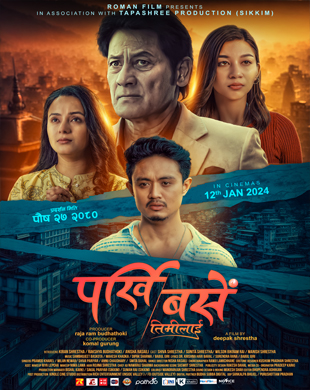
Director: Deepak Shrestha
Cast: Kiran Shrestha, Rakshya Budathoki, Anisha Rasaili, Wilson Bikram Rai, Shiva Shrestha
Year: 2024
Duration: 2 hours













